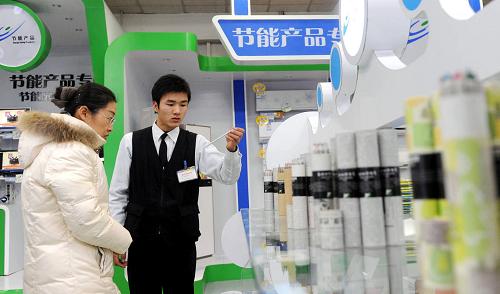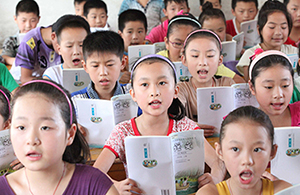Tighten supervision of subsidies for energy-saving appliances
(China Daily) Updated: 2016-01-04 07:56
 |
|
A shopper inspects energy-saving products in a supermarket in Beijing on Dec 26, 2013. [Photo/Xinhua] |
To encourage green consumption, the State Council, China's cabinet, had subsidized energy-saving home appliance buyers by paying certain amounts to manufacturers who sold their products at discount from June 2012 to May 2013. Several home appliance makers have now been asked to pay back part of the subsidies because some miscalculations led to overpayment. But this is just one of the problems that affected the implementation of the policy, says an editorial in Southern Metropolis Daily:
The subsidy for energy-saving appliances did boost their sales, but the policy raised certain questions such as the possibility of government intervention in the market and its negative impact in the long run.
The most common question was about the policy's implementation. It was meant to encourage people to buy energy-saving appliances, but there were loopholes in its actual implementation and enterprises could have used them to cheat the government.
As early as June 2013, the National Audit Office found that several enterprises, including Gree, Glanz, Midea and TCL, had fudged figures to get more subsidies than they were entitled to.
Although none of the enterprises have revealed how they cheated the government, some of the dubious methods they used are rather obvious. For example, some enterprises raised the prices of their products and also got the consumers' share of the subsidies while some others doctored data to get subsidies for even non-energy-saving devices.
As a result, the subsidies didn't help energy-saving appliance makers win the competition. On the contrary, many companies got the subsidies without making energy-saving products.
Therefore, the auditing office and other government departments have taken action at the right time. Some enterprises say it is their agents and salespersons that cheated the government.
But since the enterprises submitted the subsidy data, they should be held responsible. Only when rule-breakers are punished can normal market order be maintained.
The subsidy policy was suspended in 2013 amid controversies. But the Beijing municipal government has been offering local subsidy to energy-saving appliance makers since November. And since the new regulation doesn't make great progress in supervising the enterprises, we hope it is strengthened before being implemented in other cities and regions so as to avoid the past problems.
(China Daily 01/04/2016 page8)
- Subsidies for energy-saving appliances reintroduced
- Low-Carbon Trade: Trade Structure Adjustment based on Energy-Saving Objectives
- Energy saving project pays off in East China
- China launches 'energy saving' week to raise awareness
- NDRC investigates energy saving in Xinjiang
- Country on target to meet its annual energy saving goal
- Energy saving and emission reduction projects get financial support from the Bank of Beijing
- Shanxi releases 14 energy-saving standards

Charlotte and Emilie Meaud, twin sisters, were killed at the terrace of the Carillon, during the attacks on Paris, on the 13th of November.










